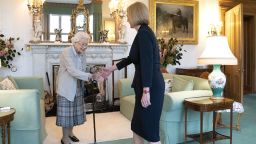Even by recent standards, Thursday was a jaw-dropping day in British politics.
Liz Truss, a born-again Brexiteer who took over from Boris Johnson a mere six weeks ago, announced that she was to resign. In her wake, she leaves an economic crisis precipitated by a “growth plan” full of unfunded tax cuts, and a Conservative Party that may be in office, but is most certainly not wielding much power.
It is hard to overstate just how much impact Truss’ accession to the top job had on British politics in such a short space of time. Her radical economic policy proposals – even before they were even enacted – caused the pound to sink to its lowest level against the dollar in decades.
The turmoil caused government bonds to soar, which had a negative impact on government borrowing and, more perilously, real people’s pension funds. The rise in interest rates forced up mortgage repayments, and lenders scrambled to pull their products from the market, dashing the hopes of prospective homeowners almost overnight.
Faced with the fury of her own party – for whom fiscal discipline had, for so long, been a watchword – Truss capitulated. She sacked her finance minister, lost her home secretary and has created even more divisions in a party that has been tearing itself to shreds ever since the 2016 Brexit vote.
It was only a matter of time before she was forced out.
Politicians across the divide are asking the same question that the majority of the country are probably asking themselves: What on earth happens now?
What we know for certain is that the UK will have a new prime minister by the end of next week. That person will be chosen, again, by the Conservative Party – its members of parliament and its grassroots members — rather than the general public. It is a state of affairs that has infuriated the opposition Labour party, which is demanding a general election.
That won’t happen. The Conservative Party’s poll ratings are at a record low, and as the date of an election is within the government’s gift, these turkeys won’t be voting for Christmas.
So, the party will drag itself through another leadership election and a second prime minister in as many months. At least it will be swift: Party managers want it all over by the end of next week.
Who might stand is currently a bit of a mystery. CNN was told by allies of former prime minister Boris Johnson that he is considering what would be an astonishing comeback, despite resigning in disgrace just a few months ago.
While people close Johnson are making the case that he is the only candidate who could truly unite a bitterly divided party, others are quick to say that there was a good reason he was forced from office.
Those reasons, for those with short memories, are that he was hit by so many scandals – from breaking his own Covid regulations to installing someone with a reputation for sexual harassment as his deputy chief whip – that his position as leader of the UK was simply untenable.

Unity candidates?
Former allies who left Johnson’s side after things got too much say that installing him would leave the Conservatives open to quite a simple line of attack: why is this person who was proven to be wholly unfit for high office suddenly the best person to lead the country?
Both Conservative MPs who fear a Johnson return and officials from the opposition Labour Party pointed out to CNN that Johnson is also under investigation as to whether he deliberately misled parliament over the so-called Partygate scandal.
There are other options for unity candidates. Penny Mordaunt, one of Truss’s cabinet ministers, is thought to be weighing up running for the job. She is a Brexiteer who is popular across the party and regarded as a sensible moderate who would take a calm approach to leadership. She openly criticized Truss’s leadership while in her cabinet by saying she wanted to see welfare payments rise in line with inflation at a time of serious tension in the party, which will have won her praise from Truss critics.
There’s Rishi Sunk, the former finance minister, whose resignation from cabinet was thought to be the catalyst for Johnson’s downfall over the summer. He was Truss’s final rival in the leadership contest and is loathed by Johnson’s supporters, so his elevation would likely be unpopular with large parts of the party.
And being popular with the party – MPs and members – is going to be critical for whoever takes over. Divisions over everything from Brexit to fiscal discipline has made a party with a large parliamentary majority virtually ungovernable.
Leaving aside the personal dislike people might have of individuals like Johnson, Truss or Sunak, the sense that the Conservative Party is an untamed beast charging from one crisis to the next has created the impression that it is in terminal decline.
Conservative MPs and officials are utterly despondent. If you even compare Truss’s resignation to Johnson’s, just a few weeks before, there were no supportive MPs lining the streets or army of supporters smiling on. It was a bleak, cold speech to a quiet Downing Street.
A large number of Conservative MPs think that the party has absolutely no hope of winning the next general election. And seeing as calling a general election is something in the government’s gift, that means clinging to power as long as possible in the vague hope that things will improve.
The Labour Party has gone in the space of a few short weeks from believing itself to be an upbeat government-in-waiting to being absolutely furious that the Conservatives are willing to install another leader with no mandate, depriving the public of a stable government.
This is the current state of UK politics. The government of the day will not call a general election. A generous analysis might say that this is because they think the country needs stability at a difficult time. A more cynical analysis, alternatively, could be that they are terrified of how bad their election loss could be.
Things will become clearer over the next 48 hours as candidates come forward and the process for a smooth transition it outlined. But if the past year of British politics is anything to go by, the coronation of a new prime minister will be accompanied by nasty briefings and dirty politics to which we’ve become well accustomed.
The simple truth is that the big beasts of British politics are likely to remain at each other’s throats for the foreseeable future. And given the state of the country, that’s terrible news for its citizens.



